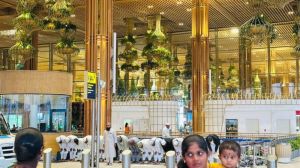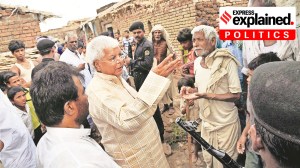Down on the Farm, by the Golf Course
For the past month or so, a hunched man with watery eyes and stained teeth named Xi Qiuyuan has raked piles of corn to dry in the sun. Then...

For the past month or so, a hunched man with watery eyes and stained teeth named Xi Qiuyuan has raked piles of corn to dry in the sun. Then he has watched it. Xi is a night watchman, and what he watches is the corn.
He sleeps outside on a pallet of packed mud and keeps warm with a crude brick oven. He uses a handmade rake to sweep the corn along the side of a narrow farm road. He has no complaints but could do without the SUVs. ‘‘It’s hard to fall asleep because of the noise from the traffic,’’ said Xi, 40, one morning as motorists whizzed by. ‘‘By 2 a.m. it is quiet.’’
All across China, the fall harvest has ended. But unlike the activity in the country’s vast agricultural regions, where the harvest shapes daily life, the tumult of daily life in Beijing is reshaping what remains of the harvest. Beijing, after all, is a city of 15 million to 17 million people, depending on who is counting. Out on the edges of the city, where farmland is fast being converted into suburbs, farmers herding flocks of dirty sheep compete for space on dusty roads with clattering blue trucks carrying construction materials for the latest gaudy subdivision or high-rise building downtown.
There is a constant collision between the two Chinas—one urban and racing into the 21st century, the other rural and seemingly locked in the 18th. Urban is prevailing, as recent government statistics show that at least 40 million farmers have lost their land to the demands of modernization and development.
For some farmers the change is an opportunity for a better life. For others it is an abrupt end to the only life they have known. Down a newly paved road outside the Beijing beltway known as the Fifth Ring Road, Lei Deqing, 54, chopped rows of dead, brown cornstalks with a crude bamboo scythe as his small flock of sheep and goats chewed on the stubble. He worked about 100 yards from a golf course. His village, Bei Dian, once owned large tracts of this land, only to have it whittled away by development projects that brought little in return.
‘‘The gap between the poor and the rich is getting dramatic,’’ Lei offered without prompting. ‘‘We barely have any land now.’’ Asked about the golf course at the end of the newly paved road, Lei scoffed. ‘‘Aaah!’’ he growled. ‘‘How many Chinese can afford that? It’s only the officials and rich people who can afford it. They will beat you if you go in.’’
Beijing is actually an enormous geographic region that incorporates more than 6,000 square miles beyond the city itself, including the farm areas being swallowed by urban expansion. Through the eyes of any demographer it is a rational, necessary shift, if a brutal one for those who know nothing but the farm.
A few hundred yards up the road from Xi, a cluster of middle-aged women slurped bowls of noodles and sat beside stacks of corn. Asked if a place exists for them in a new China, the women regarded the question as nonsense. ‘‘We are farmers,’’ one woman said. ‘‘We love farming. That is enough.’’
But Dai Shumin has learned that it is not. Dai, 54, is the grande dame of Xia Xin Pu, a tiny village being squeezed by an expanding Beijing. Her parents farmed corn, rice and sweet potatoes in this same village, and she learned to plant crops and pick cotton. In 1986, after China had started its rush toward a market economy, her husband got a job in a library. His income bought a car, and the couple started a transportation company. In turn, that income financed a pig farm that later brought enough money to buy the restaurant now run by her son. Her daughter works in the city. Her husband still works in the library.
She no longer needs farming for income. Her house has new leather furniture, a computer and a wide-screen television. But she still has a few dozen acres and cannot imagine not planting them. She hires migrant workers to do most of the work. ‘‘It’s not about money,’’ she said. ‘‘It’s more of a habit. I’ve been farming since I was young, and it pains me to see the land so empty.’’
New York Times



- 0116 hours ago
- 0215 hours ago
- 0312 hours ago
- 0416 hours ago
- 0516 hours ago




























